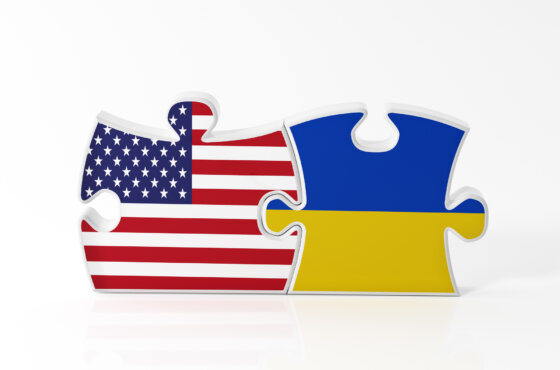A bank in the United States may suddenly close your account if it considers transactions on it to be suspicious
Banks close customer accounts without much explanation or warning. What to do in order not to be left without money and cards, reports Yahoo.

Photo: IStock
Naafeh Dillon had just left a holiday light show at Saks Fifth Avenue in New York City when he learned that all of his bank accounts had mysteriously disappeared.
After the show, Dillon, his girlfriend, and a few friends escaped the cold and had dinner at a French bistro, but when it came time to pay the check, his credit card was declined. Then his debit card was rejected. It must be some mistake, he thought, because he had a lot of money in his account.
But when he returned home that evening in mid-December and called his bank, Chase, the client's representative broke the news: the bank had dropped him as a client. The spokesperson said he should have received the letter in the mail, but could not say more than what was in the notice - "unexpected activity" led to the closure of his accounts.
On the subject: Former Philadelphia treasurer jailed for tax evasion: he will be deprived of US citizenship
“I didn’t get any warnings or red flags,” Dillon, 28, said. “It was completely unexpected.”
Since he was not given a specific reason for the closure, he could not refute any suspicions.
Rise in reports of suspicious activity
With fraudulent activity skyrocketing during the pandemic, some banks have become even more closely monitoring their customers' transactions and closing their accounts when deemed necessary.
Financial institutions are required to alert regulators and law enforcement with a suspicious activity report if abnormal behavior occurs that they cannot easily explain.
Not all reports result in account closures, and not all closures result in reports. But if banks do not report suspicious activity and regulators discover problematic transactions later, banks and their compliance officers could potentially face all sorts of penalties.
“Therefore, all their incentives are directed towards closing accounts,” the SAR explained on the website of the Banking Policy Institute, a research and advocacy organization representing medium and large banks.
Financial institutions filed 2021 million of these SARs in 1,4, according to the Bureau of the Departments of Finance. This is almost 70% more than 839 applications submitted in 314.
In addition to a general increase in fraudulent activity, the increase in filings could be driven by several factors - more alerts from government officials informing banks of specific activities, increasingly sophisticated technologies to detect them, and tighter scrutiny by regulators.
However, in most cases, the clients are probably innocent. A 2018 study by the Banking Policy Institute found that, on average, only 4% of the 640 SARs from a sample of large banks require follow-up by law enforcement, according to a study that examined 000 million alerts.
"It's the bank's version of 'If you see something, do something,'" said Sharon Cohen Levine, former chief of the money laundering and asset forfeiture unit in the U.S. Attorney's Office for the Southern District of New York and now a partner at Sullivan & Cromwell, who advises financial institutions on compliance with anti-money laundering laws.
Vague explanations
Dillon, who lives in Brooklyn, was interviewed the day after his cards were rejected at a restaurant. Convinced that his debit card should work—after all, the Chase mobile app reflected his balance—he tried to use it again to pay for freshly printed copies of his resume. After his card was rejected again, he called the bank from the printing house. The bank only repeated what he had told him last night.
Like the article? Support ForumDaily!?
The next morning he went to his bank branch. He left with a cashier's check for the account balance, but no satisfactory answers.
Later that evening, he finally discovered the bank's letter: "Financial institutions have a responsibility to know our customers and monitor transactions," it said. “After careful consideration, we have decided to close your accounts due to unexpected activity on a particular Chase account.”
Still frustrated by this vague explanation, Dillon called the number given in the letter. After some persuasion, the representative told him that the decision was ultimately made by the bank's global security and investigation team. Will a representative transfer him to this department? No.
“I reviewed my account activity over the past few months and was unable to see or detect any unusual activity,” Dillon said. “This whole ordeal has been painful and difficult.”
Was it one of those contrived cases? His family, who paid for his tuition and living expenses, regularly sent him money from Pakistan via bank transfers, Western Union and, most recently, from a family friend in New York. “This has been going on since the day I arrived in New York and the bank never once asked me about it,” he said.
After The New York Times called the bank on Dillon's behalf, he received another call from the bank, which launched an investigation. A spokesman later told him that they "could not confirm any wrongdoing" on his part.
The bank said that when the bank needed to close an account, it tried to give customers enough time to move to another institution. "Closing an account is often a last resort after other options have been considered to protect our customers and the bank," a spokesman for JPMorgan Chase & Co. said.
delicate balance
Individual financial institutions must report to a Bureau of the Department of Finance called the Financial Crimes Enforcement Network or FinCEN. Its job is to protect the financial system from criminal activity, including money laundering and terrorist financing.
And banks play a central role in collecting this data.
Banks can close a client's account for any reason and at any time, and this clause is detailed in fine print in his client agreements. When they reset an account it is usually because they are trying to protect the institution (or customer) from potential fraud.
It usually starts with an algorithm programmed to detect certain patterns or behaviors. The customer's transactions could be confusing - perhaps due to repeated cash deposits of just under $10, a tactic known as structuring, since anything above that amount is usually flagged. Or maybe the customer had a transaction with another party that was considered suspicious (and in some cases banks don't want the customer to be a victim).
After the warning signal is sounded, financial institutions have a dedicated (human) team that analyzes the situation to find a reasonable explanation.
These employees may decide to close the account and cut their losses - and they may file an SAR with the federal government. They can also only do one or the other — or neither — after talking to the client.
SARs are mostly kept secret. Customer service representatives may not know if such a report (or anything about its contents) has been filed, so it may be difficult for them to explain account closures to customers.
“This is a high level of confidentiality and it is a crime to disclose that a SAR has been filed,” Cohen Levin said.
In some cases, banks can be completely honest about why they chose to close a customer's account. The account may have been inactive for too long, or the consumer may have generated too many overdrafts.
It's a delicate balance. Banks want to avoid over-aggression that could disenfranchise immigrant communities and others who may have difficulty obtaining traditional bank accounts. In addition to regulators and customers, banks must answer to their own shareholders - and they need enough satisfied customers with profitable accounts to keep them happy.
However, the sudden closure of accounts is a big hindrance. And people exposed to them seem to talk about it more often. According to the Consumer Financial Protection Bureau, at least twice as many aggrieved account holders complained about the closure of checking and savings accounts last year than in 2017. Last year, the bureau ordered Wells Fargo to pay $160 million in damages to more than 1 million people for "substantial damage" caused by aggressive bank freezes and closures from 2011-2016.
Complaints
Not all flagged activity results in account closure. In Todd Zolecki's case, his bank didn't close his account, but closed him off from his own money.
After taking out a $401 loan in mid-January, he tried to transfer the money to a new high-yielding savings account at Synchrony Bank. As soon as the money arrived, he called Synchrony to ask if he could transfer some of it—a sum in excess of $000—to his TD Bank checking account. Not a problem, the bank told him.
But as soon as he tried, he received a notification that the transfer was suspended and his account was frozen. He immediately called Synchrony, but no further details were given to him.
"They said your account has been suspended for further review," said Zolecki, 47, who lives in Media, Pennsylvania. Why? “We can't tell you that. The only thing we can tell you is that the review may take up to 60 days,” he was told.
In another email, he was informed that his transfer was rejected because TD was having trouble processing the request; but when he called TD he was told that the bank had no record of it. He logged into his Synchrony account daily to check the status.
After speaking with the legal service provided by his employer, Zoletsky filed a complaint on January 20 with the Consumer Financial Protection Bureau and the Office of the Comptroller of the Currency, which regulates the country's largest banks.
Less than a week later, he received a call from Synchrony, and a bank spokesman said the bank had noticed out-of-state login attempts. These attempts were made by Zolecki when he was on a business trip. The rep later said that his account was initially flagged because he was trying to make an immediate transfer.
A few minutes after his conversation with a representative, on January 27, the account was reactivated.
In a statement, Synchrony said it is committed to improving "the customer experience, improving fraud detection and creating simple identity authentication" and the bank has "invested in technology and expertise to help with a growing set of threats."
Reserve banking plan
As with Dillon, the first sign that his financial life had suddenly come to a standstill came when Justin Martin tried to pay for food. Everything was closed - his bank credit and debit cards, plus his checking account.
The operators on the phone could not explain anything. The branch staff were sympathetic but offered no further clarification. Martin, who works for a financial services company himself, was worried about his creditworthiness and his ability to open other accounts. But he also feared for his existence.
"They were going to do a big test," he worried. There were no problems during the verification of these data.
Luckily, Martin already had another bank account.
“The biggest thing I learned here, and I think it applies to many areas of our lives — say, if you invest money — is that you diversify,” he said. “If all your loans or money are in one bank, it can’t be beneficial.”
A diversification strategy can also be helpful if you're worried that banks might not like your crypto trading or Only Fans side business and close everything without asking questions.
"If there's a way to separate this account from your other light bills and everything else, open this B account so your mortgage doesn't go into delinquency," said Clayton Legier, CEO of Merchants & Marine Bank in Mississippi.
Account holders can certainly try to ask questions about account activity in advance that may raise suspicions. Being able to show up at the ward and look someone in the eye can help. This is especially true if your financial life is taking a turn that might seem fishy to a stranger working at a bank who has to answer a blaring algorithmic siren.
You may be interested in: top New York news, stories of our immigrants, and helpful tips about life in the Big Apple - read it all on ForumDaily New Y.
“When something changes for you, make sure your bank knows about it. For example, now you have a used car business and you have absolutely every reason to have a lot of cash transactions,” Legear said.
This advice is little consolation for Martin. The bank never said why it closed its accounts in 2020.
It's funny that the same bank tried to hire Martin for a job. The bank's recruiting department was unaware of his problems. Martin turned down the job offer.
As a UX designer, he wonders about the systems that could save so many innocent people from wrongful bank account closures.
Read also on ForumDaily:
How to quickly find everything you need on Google
'Everything has slowed down': what a person feels when lightning strikes him
Harder than rocket science (almost): how to properly install a US mailbox
Subscribe to ForumDaily on Google NewsDo you want more important and interesting news about life in the USA and immigration to America? — support us donate! Also subscribe to our page Facebook. Select the “Priority in display” option and read us first. Also, don't forget to subscribe to our РєР ° РЅР ° Р »РІ Telegram and Instagram- there is a lot of interesting things there. And join thousands of readers ForumDaily New York — there you will find a lot of interesting and positive information about life in the metropolis.











